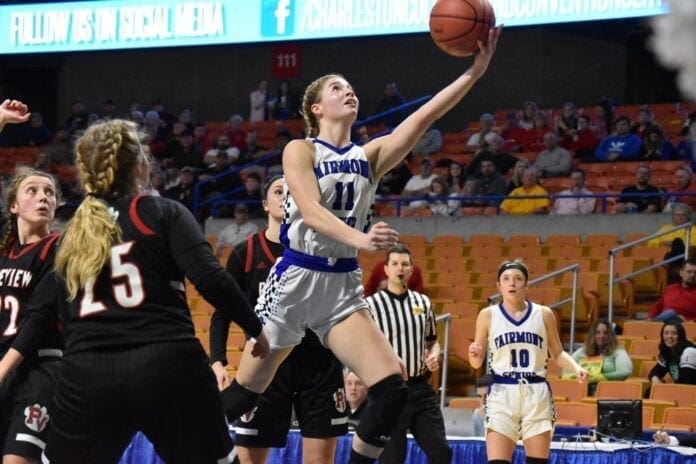The state of high school basketball entered a realm of uncertainty on November 13 when W.Va. Gov. Jim Justice announced all winter sports were postponed until January 11.
This came four days after the official start of practice for girls’ teams and a few days prior to the boys’ getting underway.
Justice cast further doubt recently when he announced during a Monday press conference that “basketball looks in real jeopardy to me.”
Reaction has been split and vocal across the state, with many taking to social media to express their disappointment and bewilderment at both the moves already made and a future one hinted at with that comment.
It’s not hard to see why.
While West Virginia high school athletes sit idly by and wait to get back to work—while WVU and Marshall athletes do not—their counterparts in neighboring states like Kentucky, Ohio, and Pennsylvania are either already playing or set to start on time.
Such is life in a bordering state that hasn’t aligned its restrictions with those surrounding.
But as WVSSAC Executive Director Bernie Dolan pointed out, those aren’t the only bordering states with differing opinions.
“On one side you have Kentucky, Ohio, and Pennsylvania who have been much more aggressive,” Dolan said. “Then there’s Virginia, Maryland and D.C. that basically shut down everything and we’re in the middle, trying to do both.”
States to the east and south postponed all sports to the spring and will try to cram three seasons of athletic competition into one.
Foregone Conclusion?
Does Justice’s most recent announcement mean the season is lost, or at least, won’t start on January 11? No.
Reservations aren’t policy, but Dolan and the staff at the WVSSAC office in Parkersburg are constantly making plans and contingency plans for an increasingly fluid situation.
Not all decisions are made at the WVSSAC level and Dolan and state athletic leaders must work within the confines of what the governor decides, and permits.
“We’re all working from a moving target and everything that’s learned about the virus, it moves and changes are made and we ultimately fall in line and make changes to our programs based upon that,” Dolan said.
Prior to Justice’s Nov. 13 announcement, Dolan noted the board was working on ways to implement a preseason training regimen similar to the tiered restrictions and timetables utilized this summer.
“That (delay) came straight from the governor,” Dolan said. “The night before, we were working on trying to come up with plans to offer workouts with restrictions like the summer workouts. It’s just a matter of enough singing off on it saying this would be a good plan.”
Whether something like that will be implemented before Jan. 11 remains to be seen. But, giving athletes time to get into some semblance of game shape prior to Jan. 11 would go a long way in helping teams hit the ground running and not waste any more precious time.
Other What-Ifs?
The reality in West Virginia is thus—best case scenario is the season kicks off Jan. 11 with some type of allowable preseason work prior to. Will that be the case? No one knows yet.
But what happens if the season is delayed further? One week? Two weeks? A month or more?
Do winter sports athletes have to choose whether it’s basketball or track, wrestling or baseball, swimming or softball they wish to participate in?
Will the spring sports subsequently be pushed back in equal amounts if winter sports must be delayed again?
Dolan noted there are multiple options being discussed similar to last spring when plans were made for a potentially later and later start that ultimately never materialized.
But he also admitted he doesn’t want to go too far down that road yet. After all, a sensible plan developed now can be viewed as a viable option potentially before such a thought is necessary.
“We’ve discussed it, but don’t’ want to get too far down that path until it’s needed,” Dolan said.
Dolan mulled over aloud a couple options that made sense, but didn’t want to divulge publicly at present. Again, such modifications are not necessary yet and he’s hoping, like the rest of the state, for a full restart come mid-January.
Delayed Timetable
One thing for certain as of now is the state tournament, if held, will still be held at the Charleston Civic Center as usual.
The delayed start to the season means a delayed start to the tournament, But Dolan confirmed dates are available in the state’ capital for both boys’ and girls’ tournaments.
“We already put out and set forth a new timetable for the tournaments,” Dolan said. “Basically, it puts everything back about 2-3 weeks so we’ll be into April for basketball and spring sports will run into late June.”
It’s far from the perfect season for the state to switch to its new four-class system for postseason basketball. That means additional games, and an additional day, are needed in Charleston.
Four champions instead of three, 16 quarterfinal games instead of 12. But it does limit the amount of time required to get through the sectional round of the postseason.
“Nothing has been ideal this year, but the only good thing about (four classes) is it does count down the number of sectional games,” Dolan said. “There’s may be only one or two sections that has to play three games to decide a champion.
“That should help us get through the sectional round quickly.”
Another option may be seeing three, two-game sessions daily in Charleston instead of two, three game sessions. That will help limit crowd size and enable the Civic Center staff to vacate and properly clean the facility between sessions.
It’s going to be interesting, no matter what way it turns out. But getting the student athletes playing and competing, in addition to safety, is job one.


